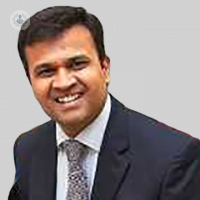Minimally invasive endometriosis surgery: Your expert guide
Written by:Endometriosis, a condition that affects a significant number of women across the UK, can bring about debilitating pain which disrupts daily life. While its exact cause is unknown, the impact it has on those who suffer from it is very real. Thankfully, minimally invasive endometriosis surgery can offer an effective solution to these troublesome symptoms for suitable patients. To tell us more about minimally invasive endometriosis surgery, we invited esteemed consultant gynaecologist and specialist in minimally invasive and laparoscopic gynaecological surgery Mr Mohan Kumar to share his expert insight.

Understanding endometriosis
In simple terms, endometriosis occurs when tissue similar to the lining of the womb grows outside the uterus. This misplaced tissue can cause severe pain during menstruation, intercourse, and even everyday activities.
How does minimally invasive surgery differ from traditional surgical treatment of endometriosis?
Traditionally, endometriosis was often treated through open surgery, requiring larger incisions and longer recovery times. However, the innovation of minimally invasive surgery has transformed the landscape of endometriosis treatment.
What are the advantages of minimally invasive endometriosis surgery?
Less pain and discomfort
Minimally invasive endometriosis surgery involves smaller incisions, resulting in reduced post-operative pain and a shorter recovery period. This means that patients can return to their normal routines more swiftly.
Minimal scarring
Unlike open surgery, which leaves significant scars, minimally invasive techniques leave only tiny scars, which are often barely noticeable. This is particularly important for many patients who value the cosmetic outcomes of treatment for endometriosis.
Shorter hospital stays
With minimally invasive procedures, hospital stays are typically shorter. Patients can return home sooner, leading to greater comfort through recovery and a quicker return to normal daily life.
What types of minimally invasive surgery can be used to treat endometriosis?
There are two main types of minimally invasive surgery used to treat endometriosis: laparoscopy and robotic-assisted laparoscopy.
Laparoscopy
During this procedure, a surgeon makes small incisions in the abdomen and inserts a thin, flexible tube with a camera (laparoscope) to view and treat the endometriosis. Small surgical instruments are used to remove or ablate the abnormal tissue. Laparoscopy is highly effective and minimally invasive.
Robotic-assisted laparoscopy
Robotic-assisted surgery involves the use of a surgical robot, controlled by the surgeon, to perform precise movements. This technology provides enhanced precision and control, making it an excellent option for complex cases of endometriosis.
Is minimally invasive surgery right for me?
Your suitability for minimally invasive endometriosis surgery will depend on various factors, including the severity of your condition, your overall health, and your surgeon's recommendations. It is essential to consult with a gynaecologist who specialises in endometriosis to discuss the most suitable approach for your specific case.
If you require surgery for endometriosis and wish to schedule a consultation with Mr Kumar to discuss your options, visit his Top Doctors profile today.


